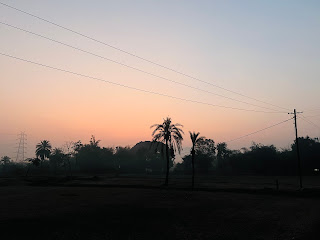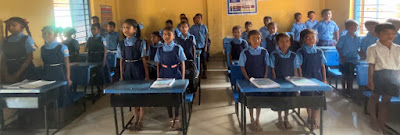Yesterday, two of my colleagues and I left work early to visit a rural settlement in the village of Udhwa, Maharashtra.
Our four-hour journey began with boarding the Dahanu local from Bandra Station. Super happy to find the carriage quite empty, we placed our bags on the overhead rack and sat back to enjoy the journey, chatting away and munching on chips (the latter was mostly all me). After two hours, we were at the small, but very clean & fairly busy Dahanu Station.
Stepping out, we decided to walk to the nearby bus depot, stopping at Chandramukhi Veg Restaurant to enjoy a simple yet deliciously light Thali.
At the depot, we were informed that the bus to Udhwa would only leave at 2pm. Having some time to spare, we sat around sharing memories of previous ST experiences. A bus that was just leaving the depot had us believe that a lot had changed since we were last here. The rickety red busses were now blue & clean, with large windows and well-cushioned seats.
A flurry of activity nearby had us realise that the bus to Udahwa had arrived. It was similar to the blue one that that just departed a moment ago. Elbowing our way through the crowd, we entered the bus and found our seats when the tc shooed us off saying there was a delay as they had to change the bus.
We got off the bus and waited by the side. After about ten minutes the new bus came to a rumbling halt in front of us. It was the rickety red one of our nightmares. Rushing in, we grabbed our seats while other passengers scurried to theirs. Soon, the tc stepped into the bus, smiling like Mickey Mouse. He looked at the bus, now filled with faces that, for him, were mostly familiar. He smiled and said, ‘Hmmm’ before starting to give out tickets.
We booked three tickets to Udhwa, asking him to let us know when we reached Loharpada.
Now, here’s a little clarity about…er…the lay of the land. The village of Udhava is located in the Palghar district of Maharashtra, in the Talasari taluka. The village is divided into various little hamlets known as padas. These are clusters of not more than 15-16 houses with vast expanses of fields separating one pada from the next. The inhabitants are tribals, working the soil and leading simple lives.
While there has been much progress since our last visit ages ago, there’s still a long way to go. I’ll tell you more about this as we move along.
A little over an hour and 41 kms later the tc, still remembering our request, stopped the bus at Loharpada, right outside the convent gates. However, we had to walk a few short metres to get to where our host was waiting for us by the side of the road. Walking into Dongripada, we received a warm welcome at the boarding school where we would be spending the day. This boarding school provides food and safe shelter to 16 young, school/college-going girls. The boarding house itself reflects the simplicity of the people it houses.
When we arrived, the girls were busy practising for the soon approaching Christmas celebrations.
Keeping our bags inside, we freshened-up and sat in the courtyard, sipping on hot, lemongrass flavoured tea, freshly prepared. That done, we accompanied Sister on her visit to the families of Dongripada.
As I mentioned earlier, these villages & padas are home to the tribal community. Their homes, made largely of bamboo and mud, are simple, mostly bare of luxurious entrapments, and thoroughly suit the simplistic life they lead. Inside, there is kitchen set up in one corner with shining utensils standing nearby, and silos holding rice, home-grown through the sweat of their brow and the strength of their back. These indoor silos are large bins made of coconut palm caked with a layer of mud. Once it’s filled with grain, it’s sealed with a cover of leaves, layered over with mud and then the palm mat. All this protects the grain from rats and keeps it safe for daily consumption by the family, until the next harvest season.
Most houses have a courtyard in which we found an assortment of birds and animals. Chickens, cows, goats, dogs, cats and, surprisingly, even a turkey. Then there are the children - with large curious eyes & chubby-cheeks, they hide shyly behind their mothers, braving a peek every now and again. A few, after much encouragement, tell us their name and share beautiful smiles.
The stories willingly shared by the families tell tales that made us, both happy and sad. While it’s great that many are choosing to be educated, even walking long distances to get to school, jobs are not easy to secure, leading to much disappointment.
We met a father whose sons - one a B.Sc Graduate, the second an Engineer and the third, with an MBA degree, were all unemployed and having to make do with working in local factories or in the farm for a pittance.
Two sisters, one a seamstress and the other who previously worked in a factory, had a similar story to tell.
We also visited a mother who spoke of her daughter, a girl of 8, who had suddenly stopped going to school since the last couple of months. No one had been able to get through to her or understand why she claimed to be ‘scared’ to go to school. A few probing questions made me believe a child psychologist was needed to assist in this situation, but sadly, no such help is available here. So the family just prays over her, hoping she’ll snap out of the phase.
But even while one recognises the many needs of this rural community, we cannot miss the joy they find in the simple lives they lead. Their bright smiles shine through their difficulties, forcing us to look within at what we, in the big cities, have left far behind.
With these thoughts bearing heavily in our hearts and minds, we walked along to the convent, to greet the Sisters living there. Through them, we learnt about the many successes and struggles faced by rural schools. There is a dearth of good quality, dedicated teachers as almost no one wants to work in these remote villages where challenges are far more than the resources available.
That evening, back at the boarding house, we sat once again in the courtyard, sharing our experiences & observations of the day. In addition, we gleaned some more information about the boarding and the villagers, from our host.
Finally, after a wholesome meal of pulses, bhakri and some khichdi, we were ready to call it a day. It was only a little after 10pm by the time we had bathed and rolled out our sleeping mats. Very early by city standards, I know, but here in the village, it was time for bed.
The next morning, at 5am, we were woken by the sounds of the girls getting ready for a new day, their anklets tinkling as they moved around, filling their buckets at the hand pump just outside the door. It was bath time for them, following which they, all neatly dressed, made their way to school & college. The frequency of busses and autos is very poor, so most children often walk for hours to get to school, requiring an early start to the day.
Since we were up, we, too, changed out of our night clothes and decided to take a walk. The morning was very chilly and the road was deserted as we walked along. We waited to watch the rising sun colour the sky in pink and gold, enjoying the silence cut only by a few roosters in the distance and the soothing strains of the morning Aarti, that the wind was carrying across the fields. Silver dew drops sparkled on the leaves and shrubs that served as fences for the village homes.
We were glad of the hot breakfast of roti and omlette, and the even hotter glass of tea that did much to shake the cold off our bones.
After breakfast, we headed off to a neighbouring pada to visit a few more families. The stories were the same as were the smiles.
We also paid a visit to a primary school run by the Zilla Parishad. Of its two classrooms, only one was occupied by 30 little scholars with bright faces and neat, blue uniforms. The girls also had lovely blue ribbons in their hair and the class. The students, in a sing-song voice, greeted us with a ‘Good Morning, Madam. Namaste.’ Encouraged by their very enthusiastic teacher (a rare species in this corner of the world), they recited for us some poems and songs in English and Marathi. Their sweet voices and the obvious pride on the teacher’s face had us asking ourselves, once again, ‘how could we help?’
Holding that thought, we made our way back to the boarding house for a short period of rest. We spent a while discussing the village and the school we had just visited. Meanwhile, having prepared our lunch, Catherine, the very cheerful helper, had started with getting lunch ready for the girls who were already returning from school. A few girls were already in the dormitory, sitting at their desks, studying.
We decided to have an early lunch in order to catch the bus back to Dahanu station. The meal that afternoon, comprised of rice, dal and a mildly spiced preparation of green peas. Simple, wholesome and delicious!
Bidding goodbye to Sister and thanking her for her generous hospitality, we walked out to the main road & sat waiting for the bus. The red rattler soon arrived, this time filled almost entirely with students. At Talasari they spilled out of the bus, leaving us to enjoy our long and comfortable ride to Dahanu station, for the better part of which I was asleep. I guess I must have been quite tired for even the jarring sound of the door banging shut at frequent intervals failed to disturb me.
We next boarded the 2pm train from Dahanu. It was empty when we boarded, but got very crowded at Palghar, and then empty again when the sea of passengers disembarked at Virar. Do, our journey passed in comfort and relative silence as we sat reading, buying trinkets from train vendors and even some locally grown vegetables.
The brief visit to Udhava was a most enjoyable one, and one that was very thought provoking. While one cannot deny that things have changed - better roads, more empowered women, a marginal increase in income for some & more girls going to school - there is much more that needs be done to aid and assist the overall well-being of the villagers and quality of education in the rural schools.
Bear in mind that I am not referring to merely monetary aid. Their lives are simple, their needs are few and their smiles are genuine. In that, they are far richer than any of us.
I speak more of being generous with time and talent, in whatever way we can, as often as we can. We, who consider ourselves blessed with plenty, need to build larger tables, sharing our blessings with others, and in doing so, be blessed in return.


















No comments:
Post a Comment